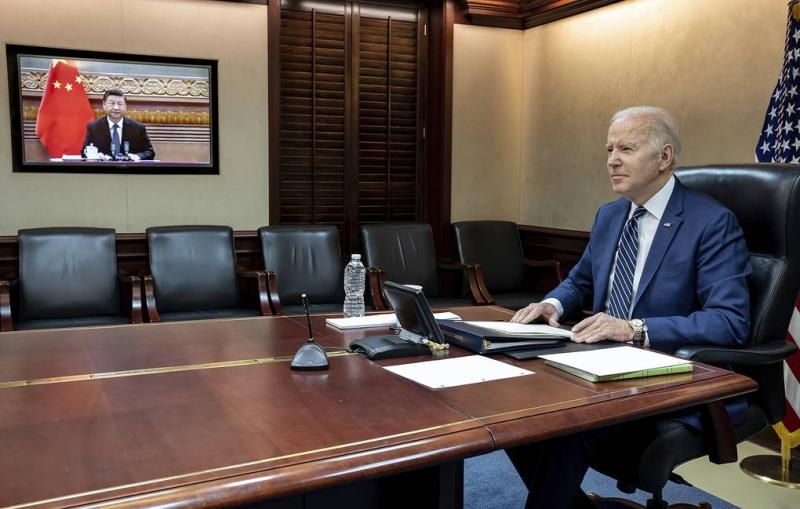
© The White House via AP/TASS
The United States, Great Britain, Japan, Australia and New Zealand have created a new alliance in late June this year called Partners in the Blue Pacific (PBP), as the White House website reads. The joint statement released on June 24, 2022 says: "Today, our five countries launched an inclusive, informal mechanism to support Pacific priorities more effectively and efficiently."
The new entity is focused on bolstering Pacific regionalism and cooperation between countries of the region and the rest of the world. According to the document, the member-states plan to "enhance the existing efforts to support Pacific priorities, in line with the Pacific Islands Forum’s upcoming 2050 Strategy for the Blue Pacific Continent" to be adopted at their upcoming summit.
Sounds sort of good: "cooperation", "support" and so on. But what is the true cause of this new alliance? Let's go figure out!
We shall start with an earlier statement by American President Joe Biden, who called the United States an "Indo-Pacific power." This automatically implies expansion of Washington's area of interest beyond the Pacific Ocean, to the Indian one. After that, the United States started massively using the term "Indo-Pacific Region" (ITR) with all that it implies. This definition covers the two recently created US-led associations ˗ QUAD (USA, Japan, Australia and India) and AUCUS (USA, Great Britain and Australia). With their true goals kept secret, they are obviously meant to contain China’s growing regional sway.
Beijing is perfectly aware of this. It is not a mere coincidence that Chinese Defense Minister Wei Fenghe said at last month’s Shangri-la Dialogue security conference in Singapore that US strategy in the region is aimed to invoke a confrontation to deter a single particular state. According to him, China deems this strategy as an attempt to create an exclusive small group to control the region. The objective is to create conflicts "to exercise deterrence."
The defense minister is echoed by Chinese Foreign Minister Wang Yi, who earlier said that the US Indo-Pacific strategy will certainly fail. The United States, waiving the banner of "freedom and openness," is actually forming separate groups in the region, seeking to instrumentalize it for the sake of profit. "Facts will prove that the so-called ‘Indo-Pacific strategy’ is essentially a strategy for creating divisions, a strategy for inciting confrontation, and a strategy for destroying peace. No matter how much it is packaged or disguised, it will inevitably fail in the end," Wang Yi stressed.
Apparently, the Chinese minister is not all that far out, as the United States keeps escalating things in the IPR because of seeing China as its key strategic enemy. Following QUAD and AUCUS, on the eve of the NATO summit in Madrid (June 28-30) they put together a new block – Partners in the Blue Pacific. Experts tend to consider it one of the means to respond to the security pact signed between China and the Solomon Islands in May this year. The United States and its allies in the Pacific fear that the document might open up opportunities for China’s broad military presence in the region.
Head of the US Indo-Pacific Command Admiral John Aquilino threw a partly sincere tantrum while delivering a speech in Washington the other day. Westerners tend to measure others’ feet by their own last, to the best of their depravity. Along with general fears that friendship between Moscow and Beijing "has no boundaries," the American admiral said: "The United States is largely focused on China’s challenge both to the United States and the world. Militarily, we’ve witnessed the largest military buildup since World War II by the PRC. The buildup encompasses all army domains and capabilities, such as naval ships, fifth-generation aircraft, missile forces, cyber, space and strategic nuclear capability."
Extrapolating its aggressive encroachments to others, the USA is not only voicing anxiety-producing things. It puts together anti-Chinese and anti-Russian alliances to make them cover the Pacific and Indian Oceans like a spider’s web to keep a lid on countries of the region whatever it takes. The creation of QUAD, AUKUS and now PBP is ample proof of this. At the same time, we emphasize that all the three entities, including the latter one, are primarily directed against China, and also Russia.
Officially, the goals are certainly different, as referred to, but assuming the real ones is no hardship, given Anglo-Saxons’ soaring hypocrisy. The Pacific Ocean mainly features once colonial possessions of Britain, France and the United States, as well as formally independent minor countries. Neither of them needed any alliances, so the idea of creating the PBP, we reiterate, aims to keep the entire region in the US orbit. Russia and China are not entitled to do so, the Westerners believe and empower themselves to do whatever they want.
Misrepresenting colonialism as "longstanding commitment to the region" and "a longstanding development partnership," creators of PBP declared their unanimous determination to support the region "according to principles of Pacific regionalism, sovereignty, transparency, accountability, and most of all, led and guided by the Pacific Islands." The bloc’s member states assure of their willingness to "remain inclusive, informal and open for cooperating with additional partners." Will Russia and China be allowed to join it, too? We doubt it strongly.
Apparently, China’s Security Pact with the Solomon Islands came as kind of surprise to the West, and it simply could not help striking back, which ultimately generated Partners in the Blue Pacific. This once again confirms that the United States craves for creating a NATO equivalent in the Indo-Pacific.









